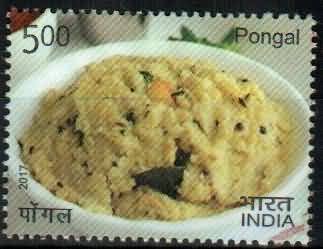Festival Cuisine : Pongal

Technical Data
| Stamp Set | Indian Cuisine |
|---|---|
| Date of Issue | November 3, 2017 |
| Denomination | Rs. 5 |
| Perforation | 13¾ |
| Printer | Security Printing Press, Hyderabad |
| Printing Process | Wet Offset |
| Watermark | No Watermark |
| Colors | Multicolor |
| Credit (Designed By) | Sh. Brahm Prakash |
| Catalog Codes |
Michel IN 3234 Yvert et Tellier IN 2925 Stanley Gibbons IN 3378 |
| Themes | Food | Gastronomy |
Indian festivals are a celebration of culture, gratitude, and togetherness, and food forms an integral part of these joyous occasions. Among the many festive dishes of India, Pongal holds a place of great reverence and tradition. Featured in the Festive Cuisine category of the commemorative postage stamp series released by the Department of Posts, Pongal represents prosperity, harvest, and the cultural richness of South India.
A Festival Dish of Gratitude and Abundance
Pongal is much more than a dish—it is an emotion deeply rooted in the harvest festival of Pongal / Makar Sankranti, celebrated every January. The word “Pongal” in Tamil means “to boil over”, symbolising abundance, prosperity, and a bountiful harvest. Prepared in homes and temples as a thanksgiving to nature, Pongal marks the joy of new beginnings and gratitude for agricultural blessings.
A Simple Yet Sacred Preparation
This traditional South Indian dish is primarily made with rice, moong dal, and cooked to a creamy consistency. It is seasoned with ghee, pepper, ginger, and cumin, creating a warm and comforting flavour.
In Andhra Pradesh and Telangana, it is known as Pongu, and in Karnataka, it is called Huggi.
There are two popular versions:
- Chakkara Pongal (Sweet Pongal) – Prepared with jaggery, ghee, and dry fruits, offered as prasadam in temples.
- Ven Pongal (Savoury Pongal) – Flavoured with spices and ghee, enjoyed as a wholesome meal.
A Culinary Symbol of South Indian Heritage
Pongal is cherished across Tamil Nadu, Andhra Pradesh, Telangana, and Karnataka, and holds a special place in festive celebrations, temple offerings, and family feasts. For the people of Southern India, Pongal is a dish that represents warmth, tradition, and cultural identity.
A Dish that Unites Tradition and Taste
Whether offered to the deity, served in temples, or prepared at home, Pongal brings families together and spreads a message of gratitude and joy. Its humble ingredients, nourishing flavours, and spiritual significance make it a timeless festive delicacy.
Conclusion
With its deep cultural relevance, simplicity, and soulful flavour, Pongal stands as a symbol of prosperity and celebration. Its inclusion in the commemorative postage stamp series highlights the essence of Indian festive cuisine and honours this cherished dish that signifies joy and abundance.
